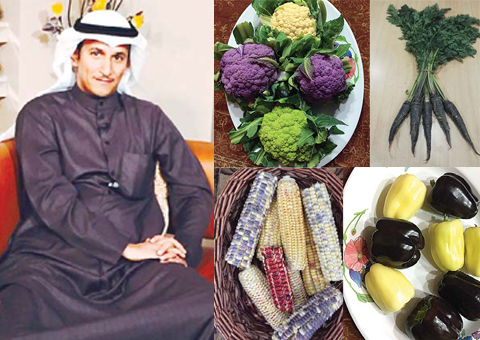 Kuwaiti farmer Yousef Al-Kraibani
Kuwaiti farmer Yousef Al-KraibaniKUWAIT: Kuwaiti farmer Yousef Al-Kraibani, who was the first to plant black tomatoes in Kuwait last year, has now grown the second crop of these rare tomatoes in addition to many other new fruits and vegetables. "I recently harvested the plants of the cold season. It included the second crop of black tomatoes that was more successful this year as I have more experience and discovered the secrets of planting it. I produced these black tomatoes by mating wild blue tomatoes with regular red ones. It's a natural organic production and was first produced by Oregon University in the US," he told Kuwait Times.
There are other new types of produce this year. "In addition to the green and purple cauliflowers that I planted earlier and yellow and purple carrots, I expanded to more plants. So I harvested colored Swiss chard, green and purple kale, which is popular in the States and not yet well-known in Kuwait, and white strawberries, all for the first time. But I only got a small quantity of white strawberries, and I intend to produce more in the future," added Kraibani.
He is now readying summer crops. "The most popular summer crop is melons. These fruits need higher temperatures, so I will start planting now to have it ready by summer. I will be planting yellow, orange and white melons - the white ones are very rare, and have only one kind. I will also plant various kinds of clear melons such as the long Korean one and the green Mexican one. For the first time, I will also plant red okra and strange kinds of cucumbers such as the lemon cucumber that is round, or the small cucumber the size of a berry," he enthused.
Kraibani has more plans. "I'm planning to market my products and expand my production for export to GCC markets. My farm produces during the whole year, as I grow regular crops in addition to rare ones. I'm also participating in the Agriculture Middle East Festival 'AGRAME' in Dubai, which is an international championship," he explained.
By Nawara Fattahova










